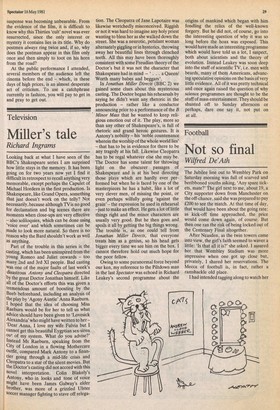Television
Miller's tale
Richard Ingrams
Looking back at what I have seen of the BBC's Shakespeare series I am surprised how little stays in the memory. It has been going on for two years now yet I find it difficult in retrospect to recall anything very memorable, except perhaps the Capulet of Michael Hordern in the first production. Is Shakespeare, like Grand Opera, something that just doesn't work on the telly? Not necessarily, because although TVis no good for declamation and big scenes there are moments when close-ups are very effective — also soliloquies, which can be done using 'voice over' and which sometimes can be made to look more natural. So there is no reason why the Bard shouldn't work as well as anything.
Part of the trouble in this series is the casting, which has been uninspired from the Young Romeo and Juliet onwards — too many, 2nd and 3rd XI people. Bad casting was one of the major faults of last week's disastrous Antony and Cleopatra directed by the great Doctor Jonathan himself. Like all of the Doctor's efforts this was given a tremendous amount of boosting by the Beeb beforehand, including an analysis of the play by 'Agony Auntie' Anna Raeburn. I hoped that the idea of choosing Miss Raeburn would be for her to tell us what advice should have been given to 'Lovesick Alexandria' who might have written to her — 'Dear Anna, I love my wife Fulvia but I cannot get this beautiful Eygptian sex-siren coW of my system. What do you advise?' Instead Ms Raeburn, speaking from the City of London in a flowing Mothercare outfit, compared Mark Antony to a financier going through a mid-life crisis and Cleopatra to a star of the silent movies. But the Doctor's casting did not accord with this novel interpretation. Cohn Blakely's Antony, who in looks and tone of voice might have been James Galway's elder brother, was more of a grizzled Ulster soccer manager fighting to stave off relega tion. The Cleopatra of Jane Lapotaire was likewise wretchedly misconceived. Riggish or not it was hard to imagine any holy priest wanting to bless her as she walked down the street. She was a neurotic, petulant woman alternately giggling or in hysterics, throwing away her beautiful lines through clenched teeth. All this may have been thoroughly consistent with some Freudian theory of the Doctor's but it was not the character that Shakespeare had in mind — . . a Queen/ Worth many babes and beggars'.
In Jonathan Miller Directs (BBC 2) we gained some clues about this mysterious casting. The Doctor began his rehearsals by saying he didn't want any rhetoric in the production — rather like a conductor announcing prior to a performance of the B Minor Mass that he wanted to keep religious emotion out of it. The play, more so than any other of Shakespeare's, is full of rhetoric and grand heroic gestures. It is Antony's nobility — his 'noble countenance wherein the worship of the whole world lies' — that has to be in evidence for there to be any tragedy at his fall. Likewise Cleopatra has to be regal whatever else she may be. The Doctor has some talent for throwing light on the obscurer passages of Shakespeare and is at his best directing those plays which are hardly ever performed but when he is faced by one of the masterpieces he has a habit, like a lot of very clever men, of missing the point, or even perhaps wilfully going 'against the grain' — the expression he used in rehearsal —just to make an effect. He gets a lot of little things right and the minor characters are usually very good. But he then goes and spoils it all by getting the big things wrong. The trouble 'is, as one could tell from Jonathan Miller Directs, that everyone treats him as a genius, so his head gets bigger every time we see him on the box. I cannot therefore hold out much hope for the poor fellow. Owing to some paranormal force beyond our ken, my reference to the Piltdown man in the last Spectator was echoed in Richard Leakey's second programme about the origins of mankind which began with him fondling the relics of the well-known forgery. But he did not, of course, go into the interesting question of why it was so long before the hoax was exposed. This would have made an interesting programme which would have told us a lot, I suspect, both about scientists and the theory of evolution. Instead Leakey was soon deep into the stuff of scientific TV, i.e. men with beards, many of them Americans, advancing speculative opinions on the basis of very little evidence. All of it was pretty technical and once again raised the question of why science programmes are thought to be the stuff of mass entertainment. They should be shunted off to Sunday afternoon or perhaps, dare one say it, not put on at all.










































 Previous page
Previous page